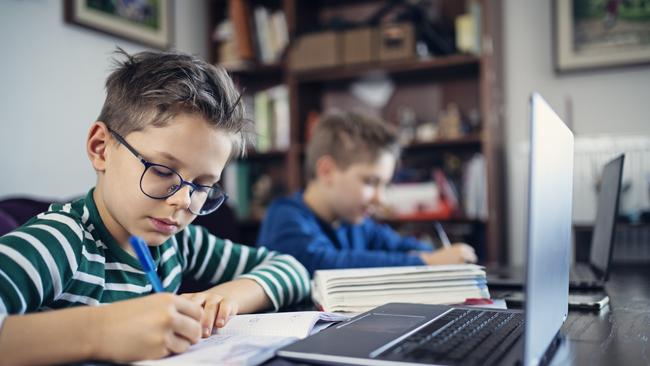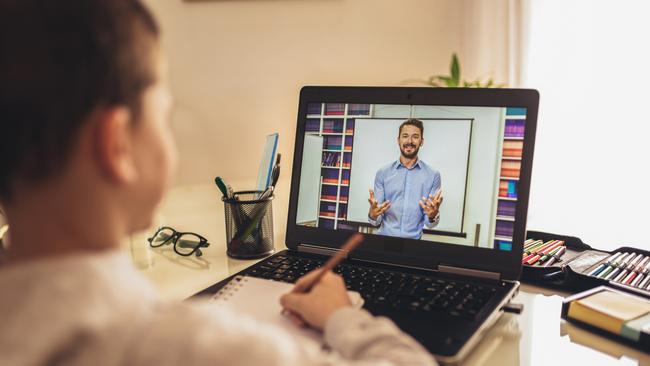Tips to help families navigate online school during lockdown
Education expert Professor Rickie Fisher has shared his tips to help households manage home schooling during lockdown.
Education
Don't miss out on the headlines from Education. Followed categories will be added to My News.
With the current lockdown in Greater Sydney now extended until 11.59pm July 16, students in these areas will be forced to spend their first week of Term 3 learning from home, as the state tackles the highly-infectious Delta strain.
This will be a tricky time not just for students and teachers — but also for parents and guardians — many of whom will be working from home at the same time.
“Maintaining boundaries between work and play spaces will make it easier for kids to focus on their learning, and remove distractions,” one primary school teacher told The Daily Telegraph.
“Keep the TV off, unless you’re watching educational programs like a documentary, and get your kids to sit at a table rather than on the floor or couch. That being said, if that’s the only way you can get them to work, it’s definitely better than nothing,” she said. “Don’t fight it.”
Education expert Associate Professor Rickie Fisher — from Central Queensland University — has shared his tips to help households manage home schooling during lockdown.

SET UP A DEDICATED LEARNING SPACE
If feasible, dedicated school time should not happen in the child’s bedroom.
At the very least, online learning should happen away from distractions including toys and video games.
The latter may be trickier to manage while most remote learning happens on screens, so parents are advised to check in regularly on progress.
CREATE A DAILY SCHEDULE
Try to maintain a daily schedule with breaks for recess and lunch as best as possible, but be flexible where you need to be.
It may help to have the whole household follow the same routine.
However, it may be unrealistic to expect students, particularly of primary school age, to focus on learning for the same duration of a typical school day – and that’s okay.
Parents homeschooling children in kindergarten up to Year 2 should only spend two and a half hours doing academic work, including 45 minutes to an hour on English and 30 to 45 minutes on maths, according to Department of Education advice from last year.
The remaining time should be spent on other subjects like creative arts and physical education.
Children in years 3 to 6 should spend three hours doing school work while those in years 7 to 10 should spend three and a half hours of the day completing work.
“A focus on english and mathematics in primary school reflects the expectation that approximately 50 per cent of the school week is devoted to these subjects,” the guidebook states.
“Students in Year 11 and 12 will follow their usual pattern of study.”

BE REALISTIC, YOU’RE NOT A TEACHER
“Parents should not feel they have to recreate the classroom environment at home,” University of Western Sydney homeschooling expert Dr Karleen Gribble told The Daily Telegraph in 2020.
“(Some schools) are asking parents to teach across multiple ages. If you have a five-year-old, a 10-year-old and a 12-year-old and they want the parents actually being the teacher at home, that is a really difficult thing to do,” she said.
Education expert Associate Professor Rickie Fisher shares this advice: “There of course will be some learning and activities that cannot be completed online or through the supervision of the parents – this is okay! Children are robust and will adapt to the situation,” he said.
HELP BUT DONT TAKE OVER
Be available to help your child with tasks they’re having trouble with, but don’t do the work for them. Encouraging children to learn to think for themselves and problem solve is just as important, if not more so, than their academic learnings.
“I think some parents worry that if their kids get things wrong, we’ll think the parents are doing a bad job. But that’s not the case. We’re just happy to see parents doing their best in hard circumstances,” our primary school expert said.
MANAGE SCREEN TIME
Much like distinguishing work from play’within the house, this needs to be done on screens. During school time’ TVs, computers and smart phones should be used for learning solely.
Try and encourage kids and teenagers to take their play breaks away from screens, and to have a break from screens once their school day ends – before they get back in front of screens in the evening.
Doing something together, like going for a walk, might help.
Remember, there is a difference between home-schooling and remote learning.
“There is a perception because the children are at home, the parents are home-schooling – home-schooling as a construct is quite different to that which requires parents to support and facilitate the learning that has been provided by the school classroom teacher,” Associate Professor Fisher said.
His advice is that during remote learning, the role of parents (were possible) is to:
– Support the classroom teacher to ensure the children are on task
– Have all necessary materials to complete the tasks set by the teacher
– Have an environment where learning can occur and is free from distractions
– Provide guidance to the children through the tasks provided by the teacher



